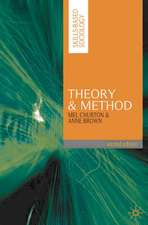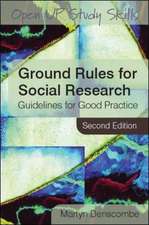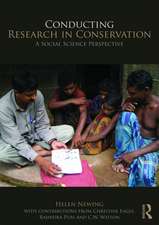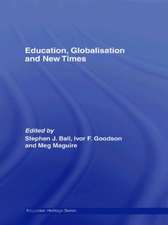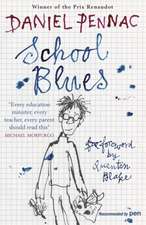Reframing Educational Research: Resisting the 'what works' agenda
Editat de Valerie Farnsworth, Yvette Solomonen Limba Engleză Hardback – 31 mai 2013
In applying theory to situated accounts of various educational practices and learning contexts, this book explores mistaken assumptions about the ways that research can ‘inform’ or otherwise impact practice. It problematises a ‘what works’ agenda but also points to potentially more productive research-practice relationships in education. Experienced contributors describe how they have used a variety of context-sensitive theoretical approaches in the socio-cultural and discursive traditions to both understand practice and address a wide range of practical issues in education.
At its core Reframing Educational Research challenges two commonly held assumptions:
- that "best practice" is readily identifiable in a way that is then transferrable to new contexts for use by practitioners more widely, and
- that theory will not help with what to do on Monday morning in the classroom or in developing policies with direct and visible impact.
Reframing Educational Research is an invitation to all researchers to identify new opportunities for advancing theory and practice in education. It is a must-read for all practitioners and researchers in education.
| Toate formatele și edițiile | Preț | Express |
|---|---|---|
| Paperback (1) | 401.11 lei 43-57 zile | |
| Taylor & Francis – 24 mai 2013 | 401.11 lei 43-57 zile | |
| Hardback (1) | 1081.40 lei 43-57 zile | |
| Taylor & Francis – 31 mai 2013 | 1081.40 lei 43-57 zile |
Preț: 1081.40 lei
Preț vechi: 1318.78 lei
-18% Nou
Puncte Express: 1622
Preț estimativ în valută:
206.93€ • 216.59$ • 172.23£
206.93€ • 216.59$ • 172.23£
Carte tipărită la comandă
Livrare economică 31 martie-14 aprilie
Preluare comenzi: 021 569.72.76
Specificații
ISBN-13: 9780415529150
ISBN-10: 0415529158
Pagini: 280
Ilustrații: 19 b/w images and 8 tables
Dimensiuni: 156 x 234 mm
Greutate: 1.22 kg
Ediția:New.
Editura: Taylor & Francis
Colecția Routledge
Locul publicării:Oxford, United Kingdom
ISBN-10: 0415529158
Pagini: 280
Ilustrații: 19 b/w images and 8 tables
Dimensiuni: 156 x 234 mm
Greutate: 1.22 kg
Ediția:New.
Editura: Taylor & Francis
Colecția Routledge
Locul publicării:Oxford, United Kingdom
Public țintă
ProfessionalCuprins
Dialogue One: Using Context Sensitive Theories to Rethink the 'What Works' Research Agenda 1. Narratives of Learning and the Unintended Consequences of Lifelong Learning Policy Sue Webb 2. Using Theory to Understand Policy Distortions in the Context of Performativity and Marketisation Geoff Wake 3. How do Mathematics Teaching Enhancement Programmes ‘Work’? Re-thinking Agency in Regulative Times Yvonne Barnes, Fiona Cockerham, Una Hanley and Yvette Solomon 4. How do you make Doctors? Emma Pearson, Janine Carroll and Tim Dornan 5. Participative Learning in Online Contexts: Focusing on ‘participation’ Erica McAteer, Mary Thorpe and Cormac Lawler Dialogue Two: Engaging With Theory to Make Things Happen 6. Developing more Equitable Education Systems: Reflections on a three-year improvement initiative Mel Ainscow 7. Researching Complex Systems: Developing a language of description Harry Daniels Dialogue Three: Refelcting on Issues in Developing a Practice-Based Research Agenda in Education as a Way Forward 8. The Practice of Theory: Confessions of a social learning theorist Etienne Wenger-Trayner 9. Using Diverse System Perspectives to Develop Policy and Practice in an Answerable Way: The case of dyslexia support in higher education Tim Deignan 10. Not Just So Stories: Practicing radical discursive research for the benefit of educational practice Anna Sfard 11. Research Cannot Define ‘Best Practice’ but it can Offer Tools for Considering ‘Which Practice’: Working through theories of identity and curriculum Valerie Farnsworth 12. Research Knowledge Production and Educational Activity: A ‘research path’ approach Seth Chaiklin Dialogue Four: Cautionary Tales on Research Use, Theory and Practice 13. Policy, Mediation and Practice in Further Education: The contribution of CHAT James Avis 14. Research, Policy and Professional Development: Designing hybrid activities in third spaces Julian Williams and Julie Ryan
Descriere
It is generally agreed that the problem of research use in education is multifaceted, involving a combination of issues attributed not only to the user end but also to the production end of research itself. This book uses a variety of context-sensitive theoretical approaches (e.g. Cultural Historical Activity Theory, discourse analysis, and Communities of Practice) to understand practice, enabling us to interrogate assumptions and to consider the possibilities for the application of research in the pursuit of evidence-based practice.
At its core this book focused on two commonly held assumptions:
At its core this book focused on two commonly held assumptions:
- that "best practice" is readily identifiable in a way that is then transferrable to new contexts for use by practitioners more widely, and
- that theory will not help with what to do on Monday morning in the classroom or in developing policies with direct and visible impact.

